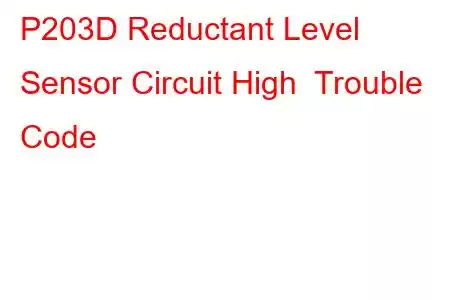P203D Reductant Level Sensor Circuit High
OBD-II Trouble Code Technical Description
Reductant Level Sensor Circuit High
What does that mean?
This is a generic powertrain diagnostic trouble code (DTC) and typically applies to OBD-II vehicles. Vehicle makes may include but aren't limited to BMW, Mercedes Benz, VW Volkswagen, Sprinter, Ford, Audi, Dodge, Ram, GMC, Chevrolet, Jeep, etc.
Did you know that the engine light comes on whenever the engine's exhaust emissions are outside of specifications? The ECM (Engine control module) monitors and adjusts dozens of sensors, valves, systems, etc. It basically acts like a built-in emissions testing station. It monitors not only what your engine is taking in but, more importantly to the manufacturer, what your engine is pumping into the atmosphere.
This is relevant here because for the most part, reductant level sensors are present on diesel powered vehicles with a DEF (Diesel exhaust fluid) storage tank. DEF is a urea solution used in diesel engines to aid in burning exhaust, in turn reducing overall vehicle emissions, which like mentioned earlier, is one of the most important purposes of the ECM. The reductant level sensor communicates to the ECM the DEF fluid level present in it's storage tank.
P203D is the trouble code defined as "Reductant Level Sensor Circuit High" and indicates an unexpected high electrical reading from the sensor circuit as detected by the ECM.
A reductant DEF tank:
What is the severity of this DTC?
I would say this is a fairly minor code considering the possibilities. Essentially we are talking about a fault in a system that monitors what happens after it is already burnt and used. That said, most state/countries' emissions standards are fairly strict so it's a good idea to address this before it does more harm to your vehicle, not to mention the atmosphere!
What are some of the symptoms of the code?
Symptoms of a P203D diagnostic code may include:
Incorrect DEF (Diesel exhaust fluid) level reading Exhaust emissions outside of specifications CEL (Check engine light) on Excessive smoke "Low" or other DEF warning on instrument clusterWhat are some of the common causes of the code?
Causes for this P203D engine code may include:
Reductant level sensor defective Wrong fluid in DEF storage tank Electrical shortWhat are some P203D diagnostic and troubleshooting steps?
The first step in the troubleshooting process for any malfunction is to research the Technical Service Bulletins (TSB) for known issues with the specific vehicle.
Advanced diagnostic steps become very vehicle specific and may require the appropriate advanced equipment and knowledge to perform accurately. We include basic steps below but refer to a vehicle year/make/model/powertrain specific repair guide for specific steps for your vehicle.
Basic Step #1
Make sure to completely clear all active codes and test drive the vehicle before diagnosing any codes present. This will clear any codes that have been left active after repairs or other intermittent, less important codes. After a test drive, rescan the vehicle and proceed diagnosis with active codes only.
Basic Step #2
I am sure after owning your vehicle for a meaningful amount of time, you know where the DEF (Diesel exhaust fluid) storage tank is located. If not, I've seen these located in the trunk and also under the vehicle. That said the filler neck for the storage tank should be easily accessible, either in the trunk or next to your fuel filler neck. Make sure you distinguish it first and foremost to avoid putting unwanted fluid in unwanted places. If you can check your level mechanically with a dipstick, go ahead and do so. Some vehicles on the other hand, have no way of verifying the DEF level other than aiming a flashlight in the hole to
Read: 22


